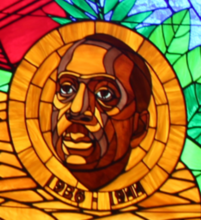From the Editor: Higher Destiny
Like so many others, I haven’t taken communion in months. I watch my church’s online service, hear the sermon, stay for the prayers and announcements, then when it’s time for the Eucharistic section I usually duck out, head outdoors, and sit a few minutes.
The wafer and wine are humble materials of earth – a matter of seed and grain, grape and soil nurtured by rain, sun, and patient hands in a particular patch of ground. So I go outside for a seat-of-the-pants communion right there. It’s not very high church. No consecrated elements are within reach, technically speaking. I don’t roguishly give myself wine or bread. Still, it’s possible to fuse my focus with the very colors of the world in front of me and feel the connective tissue of the moment under the scattered sunshine that says this is all here by the grace of God, nothing is permanent except God, we have been given a portion of life here for a time, and we should be cheering each other on, giving material comfort and hope to others. As Thomas Merton said, “We are living in a world that is absolutely transparent, and God is shining through it all the time.”[1]
Hope resides in our capacity to demystify the idols, expose untruth, stay in touch with awe, combat policies of cruelty, and praise the good.
I keep that quote of his close by, but it doesn’t cover everything. We can embrace his ecstatic insight – yet still we sleepwalk from national crisis to crisis. We can knit together the right words of doctrine and poetry, yet the 21st century keeps unraveling.
There has to be a way to bridge Merton’s exuberant news and, say, Howard Thurman’s ethical vision about the “high destiny” of the children of God:
“In so great an undertaking it will become increasingly clear that the contradictions of life are not ultimate. The disinherited will know for themselves that there is a Spirit at work in life and in the hearts of (people) which is committed to overcoming the world.”[2]
There has to be a way to bridge the mystic moment and a committed defiance of things as they are.
When I started putting this Reflections issue together, I asked writers to provide their own take on hope, a word that was getting more complicated by the day in this year of cascading emergencies. Hope seemed fragile, elusive, hard to talk about.
Can-do optimism is lodged in the American DNA. But hope and optimism are not the same. Look for optimism in the national genetic code, but hope is found somewhere else, as these writers testify – in prayer, in the stars, in the Resurrection witnesses, in the presence of God around those who suffer. As Miroslav Volf says in this issue, optimism is based on a reasonable expectation of some future outcome. Hope is what you reach for – what you need – when the orderly, statistical reasons for optimism are collapsing all around.
Hope isn’t some slender trembling reed. Christian tradition is built on the confidence that a mindful God upholds the world and oversees the world’s story. “Holy the firm,” Annie Dillard called this divine substantiation. It quickens the resolve of Thurman’s prayer:
“We make a sacrament of our determination to be better tomorrow than we are today, to be more thoughtful of our own needs and the needs of others, to be more gracious in the way we live, to the end that through us there shall come no violence to anyone; through no word of ours shall there be a heart broken, or a spirit injured. We make a sacrament of our determination in this regard, that we may be blessed by Thy spirit, O God, not because we are worthy or unworthy, but because we cannot live without Thy grace and benediction.”[3]
An old debate will always be with us: is God immanent or transcendent, intimate or distant? That tidy formulation only goes so far. Maybe better to say God’s spirit shepherds all such concepts and evades capture by any of them, and we sometimes catch up to the divine presence with words and action. That’s where much of my hope resides, in our capacity to name the powers, demystify the idols, expose evil untruth, find companionship, combat indefensible policies of cruelty, and praise the good.
In Isaiah, hope and expectation go further. In Chapter 58, God’s idea of acceptable religion is people stepping up to deliver workers from oppressive conditions, give the homeless poor a dwelling place, share bread with them, respect the sacred presence. The way literary critic Terry Eagleton reads Isaiah, God makes “salvation a political affair, not a religious one.” God is the God of the “not-yet,” who stays hidden until relief and justice and healing arrive. God will be known when people see the stranger welcomed and the hungry fulfilled.[4] Hope finds strength in that not-yet.
These are days for focus and urgency and saying what needs saying. Each Reflections voice here hopes to add something to the communion gathering around that higher destiny of all the children of God.

